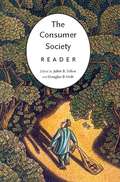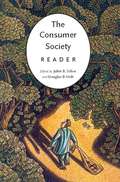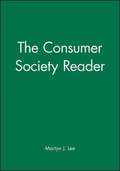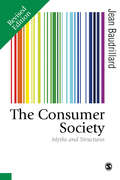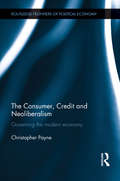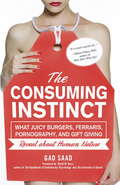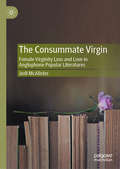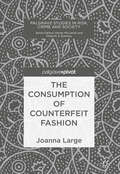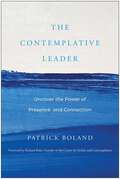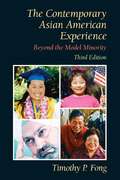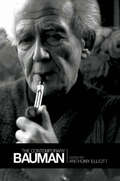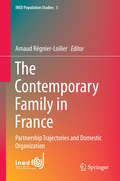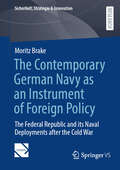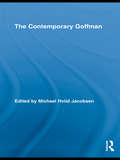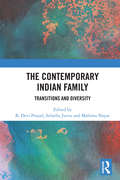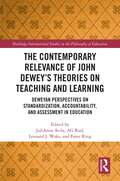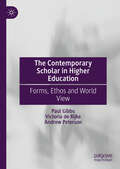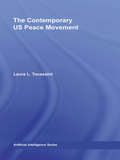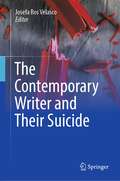- Table View
- List View
The Consumer Society Reader
by Juliet Schor D. B. HoltThe Consumer Society Reader features a range of key works on the nature and evolution of consumer society. Included here is much-discussed work by leading critics such as Jean Baudrillard, Susan Bordo, Dick Hebdige, bell hooks, and Janice Radway. Also included is a full range of classics, such as Frankfurt School writers Adorno and Horkheimer on the Culture Industry; Thorstein Veblen's oft-cited writings on "conspicuous consumption"; Betty Friedan on the housewife's central role in consumer society; John Kenneth Galbraith's influential analysis of the "affluent society"; and Pierre Bourdieu on the notion of "taste.""Consumer society--the 'air we breathe,' as George Orwell has described it--disappears during economic downtruns and political crises. It becomes visible again when prosperity seems secure, cultural transformation is too rapid, or enviornmental disasters occur. Such is the time in which we now find ourselves. As the roads clog with gas-guzzling SUVs and McMansions proliferate in the suburbs, the nation is once again asking fundamental questions about lifestyle. Has 'luxury fever,' to use Robert Frank's phrase, gotten out of hand? Are we really comfortable with the 'Brand Is Me' mentality? Have we gone too far in pursuit of the almighty dollar, to the detriment of our families, communities, and natural enviornment? Even politicians, ordinarily impermeable to questions about consumerism, are voicing doubts... [and] polls suggest majorities of Americans feel the country has become too materialistic, too focused on getting and spending, and increasingly removed from long-standing non-materialist values." -From the introduction by Douglas B. Holt and Juliet B. Schor
The Consumer Society Reader
by Juliet Schor D. B. HoltThe Consumer Society Reader features a range of key works on the nature and evolution of consumer society. Included here is much-discussed work by leading critics such as Jean Baudrillard, Susan Bordo, Dick Hebdige, bell hooks, and Janice Radway. Also included is a full range of classics, such as Frankfurt School writers Adorno and Horkheimer on the Culture Industry; Thorstein Veblen's oft-cited writings on "conspicuous consumption"; Betty Friedan on the housewife's central role in consumer society; John Kenneth Galbraith's influential analysis of the "affluent society"; and Pierre Bourdieu on the notion of "taste.""Consumer society--the 'air we breathe,' as George Orwell has described it--disappears during economic downtruns and political crises. It becomes visible again when prosperity seems secure, cultural transformation is too rapid, or enviornmental disasters occur. Such is the time in which we now find ourselves. As the roads clog with gas-guzzling SUVs and McMansions proliferate in the suburbs, the nation is once again asking fundamental questions about lifestyle. Has 'luxury fever,' to use Robert Frank's phrase, gotten out of hand? Are we really comfortable with the 'Brand Is Me' mentality? Have we gone too far in pursuit of the almighty dollar, to the detriment of our families, communities, and natural enviornment? Even politicians, ordinarily impermeable to questions about consumerism, are voicing doubts... [and] polls suggest majorities of Americans feel the country has become too materialistic, too focused on getting and spending, and increasingly removed from long-standing non-materialist values." -From the introduction by Douglas B. Holt and Juliet B. Schor
The Consumer Society Reader
by Juliet B. Schor Douglas B. HoltThis books features a range of key discussions about consumer society. Included are much-discussed work by leading ritics such as Jean Baudrillard, Susan Bordo, Dick hebdige, bell hooks, and Janice Radway. Also included are a full range of classics, such as Frankfurt School writers Adorno and Horkheimer on the Culture Industry; Thorstein Veblen's oft-cited writings on "conspicuous consumption"; Betty Friedan on the housewife's central role in consumer society; John K. Galbraith's influential analysis of the "affluent society"; and Pierre Bourdieu on the notion of "taste".
The Consumer Society Reader
by Douglas B. Holt Juliet SchorThe Consumer Society Reader features a range of key works on the nature and evolution of consumer society. Included here is much-discussed work by leading critics such as Jean Baudrillard, Susan Bordo, Dick Hebdige, bell hooks, and Janice Radway. Also included is a full range of classics, such as Frankfurt School writers Adorno and Horkheimer on the Culture Industry; Thorstein Veblen's oft-cited writings on "conspicuous consumption"; Betty Friedan on the housewife's central role in consumer society; John Kenneth Galbraith's influential analysis of the "affluent society"; and Pierre Bourdieu on the notion of "taste.""Consumer society--the 'air we breathe,' as George Orwell has described it--disappears during economic downtruns and political crises. It becomes visible again when prosperity seems secure, cultural transformation is too rapid, or enviornmental disasters occur. Such is the time in which we now find ourselves. As the roads clog with gas-guzzling SUVs and McMansions proliferate in the suburbs, the nation is once again asking fundamental questions about lifestyle. Has 'luxury fever,' to use Robert Frank's phrase, gotten out of hand? Are we really comfortable with the 'Brand Is Me' mentality? Have we gone too far in pursuit of the almighty dollar, to the detriment of our families, communities, and natural enviornment? Even politicians, ordinarily impermeable to questions about consumerism, are voicing doubts... [and] polls suggest majorities of Americans feel the country has become too materialistic, too focused on getting and spending, and increasingly removed from long-standing non-materialist values." -From the introduction by Douglas B. Holt and Juliet B. Schor
The Consumer Society Reader
by Martyn J. LeeThe Consumer Society Reader is the most substantial collection of classic and contemporary readings on consumption and consumer society for students of cultural studies and sociology of culture. From Karl Marx to Jean Baudrillard, the volume introduces students and researchers to the topics, themes, and preoccupations of twentieth-century consumer culture.
The Consumer Society: Myths and Structures (Published in association with Theory, Culture & Society)
by Professor Jean BaudrillardJean Baudrillard's classic text was one of the first to focus on the process and meaning of consumption in contemporary culture. Originally published in 1970, the book makes a vital contribution to current debates on consumption. The book includes Baudrillard's most organized discussion of mass media culture, the meaning of leisure, and anomie in affluent society. A chapter on the body demonstrates Baudrillard's extraordinary prescience for flagging vital subjects in contemporary culture long before others. This English translation begins with a new introductory essay.
The Consumer Society: Myths and Structures (Published in association with Theory, Culture & Society)
by Professor Jean BaudrillardJean Baudrillard's classic text was one of the first to focus on the process and meaning of consumption in contemporary culture. Originally published in 1970, the book makes a vital contribution to current debates on consumption. The book includes Baudrillard's most organized discussion of mass media culture, the meaning of leisure, and anomie in affluent society. A chapter on the body demonstrates Baudrillard's extraordinary prescience for flagging vital subjects in contemporary culture long before others. This English translation begins with a new introductory essay.
The Consumer, Credit and Neoliberalism: Governing the Modern Economy (Routledge Frontiers Of Political Economy Ser. #152)
by Christopher PayneThis book is an investigation into the economic policy formulation and practice of neoliberalism in Britain from the 1950s through to the financial crisis and economic downturn that began in 2007-8. It demonstrates that influential economists, such as F.A. Hayek and Milton Friedman, authors at key British think tanks such as the Institute of Economic Affairs and the Centre for Policy Studies, and important political figures of the Thatcher and New Labour governments shared a similar conception of the consumer. For neoliberals, the idea that consumers were weak in the face of businesses and large corporations was almost offensive. Instead, consumers were imagined to be sovereign agents in the economy, whose consumption decisions played a central role in the construction of their human capital and in the enabling of their aspirations. Consumption, just like production, came to be viewed as an enterprising and entrepreneurial activity. Consequently, from the early 1980s until the present day, it was felt necessary that banks should have the freedom to meet the borrowing needs of consumers. Credit rationing would be a thing of the past. Just like businesses, consumers and households could use debt to expand their stock of personal assets. By utilizing the method of French philosopher Michel Foucault this book provides an original analysis of the policy ideas and political speeches of key figures in the New Right, in government and at the Bank of England. And it addresses the key question as to why policy-makers both in Britain and the United States did little or nothing to stem rising consumer and household indebtedness, instead always choosing to see increasing house prices and homeownership as a positive to be encouraged.
The Consuming Instinct
by David M. Buss Gad SaadIn this highly informative and entertaining book, the founder of the vibrant new field of evolutionary consumption illuminates the relevance of our biological heritage to our daily lives as consumers. While culture is important, the author shows that innate evolutionary forces deeply influence the foods we eat, the gifts we offer, the cosmetics and clothing styles we choose to make ourselves more attractive to potential mates, and even the cultural products that stimulate our imaginations (such as art, music, and religion). The book demonstrates that most acts of consumption can be mapped onto four key Darwinian drives--namely, survival (we prefer foods high in calories); reproduction (we use products as sexual signals); kin selection (we naturally exchange gifts with family members); and reciprocal altruism (we enjoy offering gifts to close friends). The author further highlights the analogous behaviors that exist between human consumers and a wide range of animals.For anyone interested in the biological basis of human behavior or simply in what makes consumers tick--marketing professionals, advertisers, psychology mavens, and consumers themselves--this is a fascinating read.From the Hardcover edition.
The Consuming Instinct
by Gad SaadFor anyone interested in the biological basis of human behavior or simply in what makes consumers tick--marketing professionals, advertisers, psychology mavens, and consumers themselves--this is a fascinating read.What do all successful fast-food restaurants have in common?Why are women more likely to become compulsive shoppers and men more likely to become addicted to pornography?How does the fashion industry play on our innate need to belong?Why do men's testosterone levels rise when they drive a Ferrari or a Porsche?The answer to all of these intriguing questions is "the consuming instinct," the underlying evolutionary basis for most of our consumer behavior. In this highly informative and entertaining book, the founder of the vibrant new field of evolutionary consumption illuminates the relevance of our biological heritage to our daily lives as consumers. While culture is important, the author shows that innate evolutionary forces deeply influence the foods we eat, the gifts we offer, the cosmetics and clothing styles we choose to make ourselves more attractive to potential mates, and even the cultural products that stimulate our imaginations (such as art, music, and religion). This book demonstrates that most acts of consumption can be mapped onto four key Darwinian drives--namely, survival (we prefer foods high in calories); reproduction (we use products as sexual signals); kin selection (we naturally exchange gifts with family members); and reciprocal altruism (we enjoy offering gifts to close friends). The author further highlights the analogous behaviors that exist between human consumers and a wide range of animals.
The Consummate Virgin: Female Virginity Loss and Love in Anglophone Popular Literatures
by Jodi McAlisterThis book is a study of female virginity loss and its representations in popular Anglophone literatures. It explores dominant cultural narratives around what makes a “good” female virginity loss experience by examining two key forms of popular literature: autobiographical virginity loss stories and popular romance fiction. In particular, this book focuses on how female sexual desire and romantic love have become entangled in the contemporary cultural imagination, leading to the emergence of a dominant paradigm which dictates that for women, sexual desire and love are and should be intrinsically linked together: something which has greatly affected cultural scripts for virginity loss. This book examines the ways in which this paradigm has been negotiated, upheld, subverted, and resisted in depictions of virginity loss in popular literatures, unpacking the romanticisation of the idea of “the right one” and “the right time”.
The Consumption of Counterfeit Fashion (Palgrave Studies In Risk, Crime And Society Ser.)
by Joanna LargeThis book explores the consumption of counterfeit fashion goods. Despite the importance of the consumer in counterfeiting policy, there has been a lack of attention within criminology about the demand for counterfeit goods. A tendency to explain counterfeit consumption through deviance or ‘othering’ reinforces stereotypical assumptions about consumers and overplays the importance of superficial factors in consumption. This book develops an understanding of why counterfeit markets exist through exploring consumer behavior in consuming counterfeit fashion, and examining this in relation to attitudes on fashion, crime, harm and victimization. The book argues that there is a need to consider demand for illicit goods within a broader understanding of the nature of fashion and the fashion industry. This book will appeal to those with an interest in illicit markets, consumer behavior, fashion, criminology, and the harms associated with fashion and consumer industries more generally.
The Contemplative Leader: Uncover the Power of Presence and Connection
by Patrick BolandThe most effective leaders are deeply aware of how their presence impacts every dimension of their leadership. This guide shows leaders in any organization how to move beyond the daily noise of your environment and connect with people to bring about change where it matters most. Featuring interviews with world-renowned leaders, from Richard Rohr (contemplative teacher) to Margaret Wheatley (author of Leadership and the New Science) and Matthew McCarthy (former CEO of Ben & Jerry&’s), this book provides a framework for understanding how best to connect with who we are and with those whom we lead. In The Contemplative Leader, psychotherapist, leadership consultant, and executive coach Patrick Boland integrates ancient wisdom with scientific research. He introduces psychological models, anecdotes, reflective questions, and innovative practices that outline how to: Re-envision leadership as something that takes account of the breadth of human experience Uncover the narratives that have shaped us so we can embrace our whole self (false self and true self) Focus on both the financials and the people, the results and the road that gets us there, the personal benefits and the impact on the wider organization and community Whether you are a seasoned leader in need of a reset to connect with what&’s most important, new to leadership and looking for some &“soul&” work to do to develop authentic influence, or seeking to integrate beneficial practices into your active roles inside and outside of work, The Contemplative Leader is a comprehensive guide to shaping relationships and systems to use your power and influence for good.
The Contemplative Practitioner
by John P. MillerMeditation is a simple and practical activity that can enrich our lives and work in innumerable ways. It allows us to connect more deeply to ourselves and others and to the environment. In this book, John P. Miller, an expert in the field of holistic education, looks at mediation and how it can be integrated into one's work and daily life.Twenty years after it was first published, Miller's book remains one of the best guides to applying contemplative practice, covering a variety of theoretical, empirical, historical, and cross-cultural approaches. For this new edition, Miller has updated the text to reflect the growth of the mindfulness movement, new research into the brain, and his years of experience teaching and practising contemplation in teacher education.Whether one is interested in exploring how meditation can be used in the classroom or the workplace, or simply seeking to integrate it into one's personal life, The Contemplative Practitioner is the perfect companion.
The Contemporary Asian American Experience: Beyond the Model Minority
by Timothy P. FongThis book examines the contemporary history, culture, and social relationships that form the fundamental issues confronted by Asians in America today. Comprehensive, yet concise, it focuses on a broad range of issues, and features a unique comparative approach that analyzes how race, class, and gender intersect throughout the contemporary Asian American experience. Chapter topics cover the history of Asians in America; emerging communities, changing realities; Asian Americans and educational opportunity; workplace issues; anti-Asian violence; Asian Americans and the media; Asian American families and identities; and political empowerment. For anyone interested in an understanding and awareness beyond the simplistic stereotype of the "model minority" -through the exposure to important concerns of Asian American groups and communities.
The Contemporary Bauman
by Anthony ElliottThis text covers Bauman’s contribution to sociology and social theory. This ideal teaching text analyzes Bauman's shift from a sociology of postmodernity to liquid modernity, and provides a critical assessment of the contemporary Bauman, appraising his novel theory of liquid modernity in terms of its implications for self-identity, interpersonal relationships, culture, communications, and the broad-ranging institutional transformations associated with globalization. In addition to various extracts from Bauman's work, the book also contains a spirited reply from Zygmunt Bauman to both his sympathetic and unsympathetic critics. Bauman concludes by providing a new perspectives on his theory of liquid modernity, its differentiation from the modernity/postmodernity debate and its relation to current developments in contemporary social theory.
The Contemporary Family in France
by Arnaud Régnier-LoilierThis book provides a portrait of the family in France today, revealing many of the deep-seated, demographic changes that have affected French society in recent decades. It first focuses on conjugal and family trajectories, examining union formation, types of union, entry into parenthood, influence of religion, and separation. Next, the book explores domestic organization within the couple. It looks at gender differences in attitudes to task-sharing, division of household and parenting tasks, influence of past partnership history, and changes after a birth. The book presents a series of studies based on the French version of the international Generations and Gender Survey, a major comparative research project conducted in 20 countries to collect information from individuals aged 18-79 about relationships and processes in the life course. Inside, readers will find insightful analysis of the survey results by sociologists, demographers, and economists, and come to better understand recent demographic and social developments in France as well as the factors influencing them. The book will appeal to a broad audience of students and researchers interested in family, gender, and intergenerational relations. In addition, as the survey data are comparable across countries, the book will provide researchers with ideas for further research opportunities in Europe and beyond.
The Contemporary German Navy as an Instrument of Foreign Policy: The Federal Republic and its Naval Deployments after the Cold War (Sicherheit, Strategie & Innovation)
by Moritz BrakeSince the Cold War and beyond the Zeitenwende, Germany has increasingly come to rely on its navy as an instrument of foreign policy. The German Navy supports comprehensive maritime security and ocean governance, and its missions not only reflect its own evolution, but also change within Germany. This is a marked shift for the ‘continental power’ Germany and forms a substantial component of its much broader ‘maritime turn’ in the 21st century. Changes in strategic context, new security challenges and Germany’s evolving international role after reunification have altered the perception of the navy’s utility. Its share in the Bundeswehr’s personnel has grown and the navy has seen proportionally higher investment – or relatively less cuts owing to the post-Cold War 'peace dividend' – than either army or airforce. The author shows, that the navy has markedly changed and become increasingly useful for Germany’s foreign policy – something which, in the stormy seas of geopolitical escalation of the Zeitenwende, has already paid dividends.
The Contemporary Goffman (Routledge Studies in Social and Political Thought)
by Michael Hviid JacobsenThe sociology of Erving Goffman has inspired generations of sociologists throughout the world. Students and scholars alike have in Goffman’s unsurpassable and generous ability to capture the world of everyday life discovered an emporium of useful, incisive and quite often humorous analyses, concepts and ideas. The Contemporary Goffman highlights the continued relevance of Goffman to sociology and related disciplines – to theoretical discussions as well as to substantive empirical research – through contributions dealing with a variety of topics and themes. Some contributions concentrate on locating or reinterpreting Goffman’s work as a special kind of sociology (as is found in his literary sensibilities or his fieldwork strategies). Others focus on overlooked aspects and neglected potentials of his sociology (by applying his perspective to studies of gender, emotions and violence), while others still relate his concepts and ideas to substantive research areas (such as the media, mobile telephones, hospitals, surveillance technologies and tourism).
The Contemporary Indian Family: Transitions and Diversity
by B. Devi PrasadThis book analyses the dynamics of the development of family structure in India over the past few decades. It captures the diversities and challenges of contemporary families and provides a culture and region-specific overview of how families adapt and change generationally. The book explores the paradigms of understanding family life in India through illustrations which trace patterns of family formations in the context of large-scale social, economic and media-driven changes. Besides discussing the ongoing debates on the sociology of family, the chapters in this volume also look at diverse families experiencing poverty, conflict and displacement and demystifies families with members having a disability or non-normative sexual orientation. The book will be useful to students and researchers of various disciplines, such as sociology, social work, family studies, women’s studies and anthropology.
The Contemporary Relevance of John Dewey’s Theories on Teaching and Learning: Deweyan Perspectives on Standardization, Accountability, and Assessment in Education (Routledge International Studies in the Philosophy of Education)
by JuliAnna ÁvilaThrough expert analysis, this text proves that John Dewey’s views on efficiency in education are as relevant as ever. By exploring Deweyan theories of teaching and learning, the volume illustrates how they can aid educators in navigating the theoretical and practical implications of accountability, standardization, and assessment. The Contemporary Relevance of John Dewey’s Theories on Teaching and Learning deconstructs issues regarding accountability mechanisms, uniform assessment systems, and standardization processes through a Deweyan lens. Connecting the zeitgeist of the era from which Dewey’s ideas emerged and current global political, social, and economic contexts, the book emphasizes the importance of resilient systems in reconciliating the tension between standardized assessments and individual student development. Contributors provide insights from a range of settings across Pre-K, primary, secondary, and higher education and address topics including teacher agency, voice, leadership, and democracy. The volume will be of interest to scholars, researchers, and academics with an interest in philosophy of education, education policy and the impact of neoliberal agendas, as well as teaching and learning more broadly.
The Contemporary Relevance of John Dewey’s Theories on Teaching and Learning: Deweyan Perspectives on Standardization, Accountability, and Assessment in Education (Routledge International Studies in the Philosophy of Education)
by JuliAnna ÁvilaThrough expert analysis, this text proves that John Dewey’s views on efficiency in education are as relevant as ever. By exploring Deweyan theories of teaching and learning, the volume illustrates how they can aid educators in navigating the theoretical and practical implications of accountability, standardization, and assessment. The Contemporary Relevance of John Dewey’s Theories on Teaching and Learning deconstructs issues regarding accountability mechanisms, uniform assessment systems, and standardization processes through a Deweyan lens. Connecting the zeitgeist of the era from which Dewey’s ideas emerged and current global political, social, and economic contexts, the book emphasizes the importance of resilient systems in reconciliating the tension between standardized assessments and individual student development. Contributors provide insights from a range of settings across Pre-K, primary, secondary, and higher education and address topics including teacher agency, voice, leadership, and democracy.The volume will be of interest to scholars, researchers, and academics with an interest in philosophy of education, education policy and the impact of neoliberal agendas, as well as teaching and learning more broadly.
The Contemporary Scholar in Higher Education: Forms, Ethos and World View
by Andrew Peterson Paul Gibbs Victoria De RijkeThis book examines what a scholar looks and feels like in contemporary times. It suggests that scholars are more than people employed as academics and discusses how different world ideologies, cultures and systems view their scholars and how they might be considered in the changing and challenging nature of higher education. The book includes discussion from Islamic, Confucian, postcolonial and post-Soviet perspectives, alongside other approaches such as the scholar-artist, thinker, teacher and activist. It will appeal to students and scholars working in the philosophy of higher education, higher education practice and comparative studies.
The Contemporary US Peace Movement
by Laura ToussaintAs peace activists have faced increased government repression and accusations of being unpatriotic since 9/11, Toussaint examines how current attempts to control dissent impact the peace movement. This study offers an analysis of self-identified peace activists in terms of their demographic characteristics, motivation for activism, political opportunities, and views of the peace movement. It also discusses the processes involved in successfully mobilizing an increasingly diverse constituency and how broad-based support can be sustained beyond reacting to crises.
The Contemporary Writer and Their Suicide
by Josefa Ros VelascoThis volume is the continuation of the book Suicide in Modern Literature, edited by Josefa Ros Velasco. Considering the positive reception of this book, Ros Velasco launches the second part, entitled The Contemporary Writer and their Suicide. This time, leading representatives of various disciplines analyze the literary, philosophical, and biographical works of contemporary writers worldwide who attempted to commit suicide or achieved their goal, looking for covert and overt clues about their intentions in their writings. This book aims to continue shedding light on the social and structural causes that lead to suicide and on the suicidal mind, but also to show that people assiduous to writing usually reflect their intentions to commit suicide in their writings, to explain how these frequently veiled intentions can be revealed and interpreted, and to highlight the potential of artistic, philosophical, and autobiographical writing as a tool to detect suicidal ideation and prevent its consummation in vulnerable people. This book analyzes several case studies and their allusions to their contexts and the socio-structural and environmental violence and pressures they suffered, expressions of their will and agency, feelings of dislocation between the individual, reality, and existential alienation, and literary styles, writing techniques, and metaphorical language.
